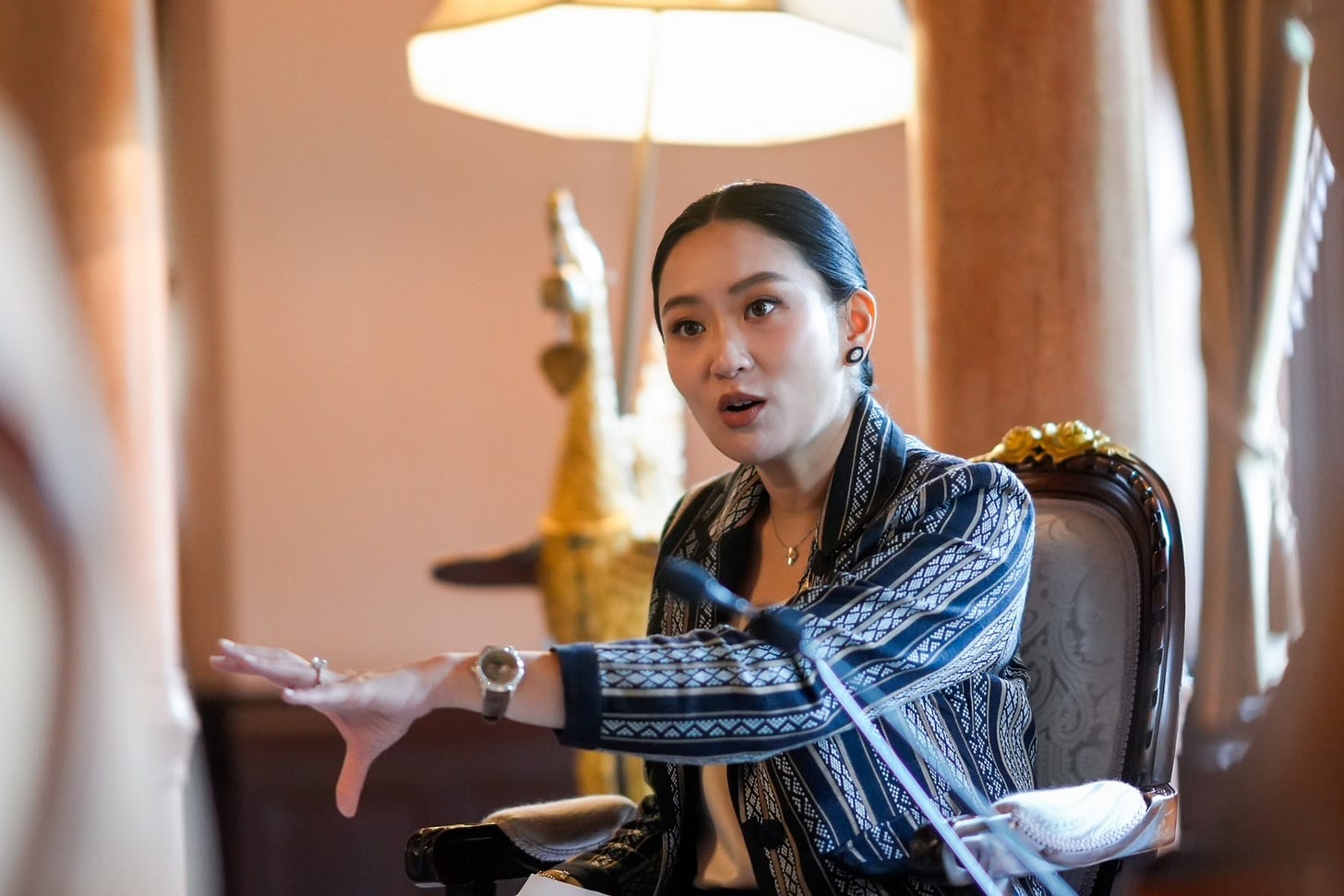Will She Stay or Will She Go?
Speculation intensifies that the Prime Minister could resign

Since my last update on the court cases facing both Thaksin and Paetongtarn Shinawatra, we have gotten a formal court date for the latter’s case. The Constitutional Court will make a ruling on whether Paetongtarn can continue as prime minister on August 29. We thus have the following major dates in our political calendar:
August 22: Criminal Court ruling on Thaksin’s lèse-majesté case
August 29: Constitutional Court ruling on Paetongtarn’s ethics case
September 9: Supreme Court ruling on Thaksin’s hospitalization case
I wrote in more detail here about where we stand on all three cases, so I want to focus specifically today on the prime minister’s situation.
In the past week, we have seen feverish speculation about whether or not Paetongtarn might try to pre-empt the Constitutional Court’s ruling by resigning. The logic behind that would be quite sound. Currently Paetongtarn’s voice call with Hun Sen has become a legal issue not only with the Constitutional Court but also with the National Anti-Corruption Commission. The Constitutional Court will rule solely on whether Paetongtarn can continue in office; the potential penalties stemming from the NACC’s case goes beyond just Paetongtarn’s future as prime minister, however. If the NACC finds evidence of wrongdoing, they must forward the case to the Supreme Court, where she could be exposed to further punishment if convicted.
As the former election commissioner Somchai Srisutthiyakorn wrote:
Don’t forget that Prime Minister Srettha and Paetongtarn’s cases are different, because when Srettha was removed from office, he was simply removed.1 There was no NACC and criminal case that followed.
And don’t forget that the Constitutional Court’s verdict is binding on every agency.
That means that if the Court has said she is guilty, then it is extremely difficult to survive the ethics case in the NACC. And there will be further penalties, which is a lifelong termination of her right to run for office, that is, she can no longer take on any political position.
As for the criminal case, which deals with misconduct on national security, if they follow the Constitutional Court then that could lead to imprisonment and even the death penalty.
Somchai thus concludes that resigning before risking a negative judgement from the Constitutional Court would be the best course of action for the prime minister to protect herself. My understanding is that if Paetongtarn resigns, the case would be moot and the court would most likely shelve the case. (The senators who petitioned for a ruling had asked only for a ruling on whether or not her position as a cabinet minister should be terminated).
So far, we have gotten only rebuttals from Pheu Thai figures when asked if Paetongtarn will resign. But I imagine that off the record, Pheu Thai figures are unlikely to be so confident. NationWeekend reported that government MPs are saying that there is a fifty-fifty chance that she is removed from office.
Since my last piece on this issue, we have also now seen Paetongtarn’s legal defense. She argued that the most controversial phrase from her phone call to Hun Sen (“whatever you want, let us know and we’ll take care of it”) was simply a way to “open space for mutual understanding.” Her comments regarding the 2nd Region Army Commander (“I don’t want Uncle to listen to the opposing side”) was a “negotiating technique that separates the problem from the individual.” She added that this was not intended as an attack on the commander.
The veteran journalist Suthichai Yoon observed that these negotiating principles are drawn from Roger Fish and William Ury’s business classic Getting to Yes. He wrote:
What a coincidence that “separate the people from the problem” is the first rule in the four principles of Principled Negotiations from this same book. The question that immediately comes to mind is: was this the original intention, or an emergency intention? The interesting point is whether it sounds like a Harvard-level negotiation from the start, or is it “finding a book to use” later on to make what happened seem more professional…this may not be a case of “Getting to Yes” but rather a case of “Getting to Justify.”
We’ll see in a little only ten days if the Constitutional Court’s judges have the same feeling as Suthichai. Only if, of course, she does not pre-empt the ruling by exiting the stage beforehand.
Former prime minister Srettha Thavisin had also been removed due to an ethics case that went before the Constitutional Court.


I know it was intentionally vagueand braodly worded, but they really need to better define and delineate the boundaries of what constitutes ethics violations with respect to the Constitution and political offices. Though I don't the current Parliament has the political will and unity to make those amendments and also see them stand up to eventual challenges in court.